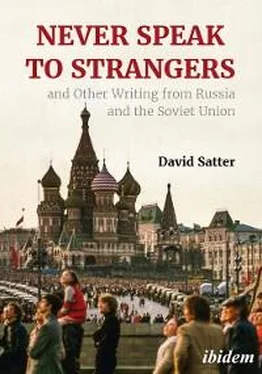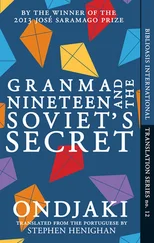Recent events have seemed to be dominated by a sinister automatism. The invasion of Afghanistan expanded at a stroke the area of the Soviet military bloc, but it also prompted U.S. grain and technology embargoes and President Carter’s intention to boycott the Olympic Games in Moscow.
Soviet officials answered the U.S. moves not by taking economic and political steps against the U.S., but by exiling Dr. Sakharov.
While it lasted, the freedom of Dr. Sakharov, who symbolised resistance to totalitarianism, epitomised the Soviet authorities’ desire to appear less repressive and to preserve elements of trust and mutual comprehension essential to the development of East-West relations. His forcible removal from Moscow signals a new attitude towards dissent and towards the opinion of the outside world.
Relations between the Soviet Union and the U.S. have now sunk to their lowest level since the Cold War, and the speed with which the fabric of relations has come unravelled reflects the diametric opposition of the Soviet and American conceptions of detente, which could only be ignored, but not reconciled.
The U.S., guided by Dr. Henry Kissinger, the former Secretary of State, sought to restrain Soviet behaviour by creating a web of mutually beneficial relations that the Soviets would be unwilling to risk by adventures in the Third World or by the kind of mistreatment of their own citizens that would attract unfavourable attention in the West.
The Soviets saw detente more narrowly, as a means of reducing military tension with the West to enable them to meet the threat from China and to gain western technology. They assumed it would be possible to continue to expand militarily in the third world and that the fate of the Soviet human rights movement, however much it might exercise western public opinion, would not affect their relations with western governments.
The incompatibility of the two viewpoints became obvious at the latest with the invasion of Afghanistan. But the Soviets mounted their first overt challenge to detente, as the U.S. understood it, in 1975, three years after President Nixon had gone to Moscow to sign the first Strategic Arms Limitation Agreement, SALT 1, and the major agreements on scientific and cultural exchanges and trade. Soviet advisers and Cuban troops intervened in the Angolan civil war and assured the victory of the MPLA faction of Mr. Agostinho Neto. The angry public reaction in the U.S. to the intervention was an important reason why the SALT 2 negotiations were put off for more than a year.
The Soviets did show some flexibility on human rights. They avoided arresting prominent dissidents and allowed others to be exchanged. They did renounce the 1974 Trade Act when amendments made to it in the U.S. Congress tied trade advantages to explicit assurances that Jews would be allowed to leave the country. But Jewish emigration, after a temporary drop, began to increase to record levels a short time later. Soviet officials made a quiet effort to use this fact to get the amendments removed.
When President Jimmy Carter took office in 1977, the SALT 2 negotiations were resumed, but the reaction to the Angolan intervention did nothing to dissuade the Soviets, using the Cubans as their proxies, from mounting another military operation in Ethiopia early in 1978. Soviet advisers, $1bn worth of Soviet weapons and 17,000 Cuban soldiers helped the regime of Lieutenant Colonel Mengistu Haile Mariam defeat an invasion from neighbouring Somalia. In 1978, Vietnam, a close ally of Moscow’s, invaded Kampuchea and replaced the Pol Pot regime with the Vietnamese puppet government of Heng Samrin.
It was against this background that the Afghanistan crisis which threatens to take U.S.-Soviet relations back to the Cold War emerged. The Soviets were faced with a deteriorating situation in Afghanistan where a pro-Soviet Government, installed by a coup in 1978, appeared in danger of being overthrown by anti-Soviet Muslim guerrillas.
The Soviets paid no political price for their intervention in Angola and Ethiopia. But they cannot have been under any doubt that there would be a sharp American reaction if they flouted the U.S. notion of detente by intervening openly in Afghanistan.
Detente created greater security in Europe, but only on the condition that the Soviets did not go too far through open military intervention in tipping the balance of forces in the Third World. The U.S. had little choice but to link detente agreements to Soviet behaviour in the Third World because the Soviet Union has several inherent advantages there. No public outcry within the Soviet Union will prevent the dispatch of Soviet or Cuban troops to a zone of conflict. Once a Soviet-style regime has been installed in another country, the Soviets work to ensure that it will never be displaced.
When the Soviets decided to go into Afghanistan they had reason to be worried about the strategic situation on their southern border. Soviet officials saw little prospectfor good relations with Iran’s religious leaders in the long run, in spite of present U.S.-Iranian conflicts. All attempts to improve relations with China had been rejected as China moved steadily closer to the U.S.
Soviet officials have said that when the Soviet Union went into Afghanistan they believed that they had very little to lose because of the failure of the U.S. Senate to ratify SALT-2, the NATO decision to deploy new medium range missiles in western Europe, the increase of U.S. and NATO defence spending, and the long standing U.S. failure to respond to Soviet “signals” asking for broader trade opportunities.
All this is probably true. But there is little possibility that the Soviet Union would have desisted from invading Afghanistan had the survival of a Marxist regime there depended on it, no matter what the state of detente. The goodwill of the detente era carried within it the risk that people in West, who value the benefits of East-West cooperation, would lose their sense of realism. Even President Carter was affected by this.
The Soviet Union, although an established power, differs fundamentally from most other states. It is organised like a revolutionary movement with the hierarchy, discipline and secrecy of the pre-revolutionary Bolshevik Party.
The idea of the Soviet Union as the vanguard of a committed ideological movement is false if measured against the Soviet people’s true beliefs and could almost be abandoned were it not frozen into the power structure of Soviet society with its lack of liberty, hierarchical gradations of authority and privilege, and proliferation of “secret” establishment; which do not guard anything that would be considered secret in any other society. But being organised like an ideological movement, it feels compelled to act like one.
When the U.S. announced its retaliatory measures, it was restricted in the methods it could choose, but the grain and technology embargoes and the threatened Olympic boycott, whatever their practical consequences, are certain to have a deep and lasting effect.
Soviet leaders often betray a desire for Western style respectability and their decision to banish Dr. Sakharov, after 10 years of tolerating his dissident activities, is one measure of how deeply the U.S. rejection of them has hurt. The attitude of the Soviet regime towards dissidents has always been repressive. The arrest and exile of Dr. Sakharov is a sign that, having given up hope of attaining Western style respectability, the Soviets are now about to demonstrate to the world the extent to which they had previously been restrained.
Mr. Roy Medvedev, the dissident historian, once noted that the 1970s had been the quietest decade in Soviet history, but added cautiously that there was no way to be sure that the stability that the leadership of Mr. Brezhnev had sought to bring to the country could be guaranteed in the years ahead.
Читать дальше












